
HOST
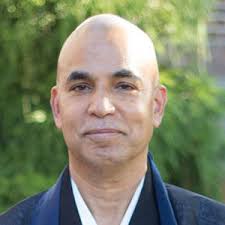
Rev. SeiFu Singh-Molares
DATES AND TIMES
Tuesdays, October 3 – December 12, 2023
2-3:30PM PST
5PM – 6:30PM EST
DURATION
22 hours (total)
All sessions will be recorded.
In the 21st century fluency across faith traditions and spiritual orientations is no longer just the province of scholars, and a select group of spiritual practitioners. It is a vital and essential skill for everyone. But perhaps especially so for spiritual directors and companions.
In the 21st century fluency across faith traditions and spiritual orientations is no longer just the province of scholars, and a select group of spiritual practitioners. It is a vital and essential skill for everyone. But perhaps especially so for spiritual directors and companions.
Why?
Because Spiritual directors and companions listen for Essence, and because we help others do the same. And in order to be able to do this most effectively, we have to be able to communicate across different belief systems, and types of discerning inquiry.
Becoming spiritually fluent across faith traditions and spiritual orientations allows us to be more effective practitioners. And to borrow the language of two interfaith masters, Huston Smith and Raimundo Panikkar, also has the significant benefit of helping us become more fluent in our own tradition(s), whatever it, or they, may be!
Finally, this type of fluency is important because it allows us to more fully honour the agency of those we companion, a core tenet of our calling. The more we can listen in to their authentic voice, the more supportive we can be.
This sounds hard. Can I do it?
Yes! Spiritual fluency comes easily to folks with contemplative dispositions. That is, for those who start with the primacy of religious, spiritual experiencing, and mysticism at the root of our faith, and our practice.
Once we realize that the language is a conduit or vehicle to the ineffable and indescribable, we can take the pressure of ourselves We can start with a few simple words and concept, knowing that they speak into our own preexisting understandings already. Change comes in small increments. And learning in this way makes the changes profound and lasting.
How?
No need to recreate the wheel. We will start with the learnings and teachings of interfaith pioneers such as Panikkar and Smith, along with Bede Griffiths. We will review historical examples of fluid interfaith relations, such as Seventh Century Spain, with its magnificent examples of respectful and highly evolved interfaith dialogue in the service of spiritual companionship and collective discernment. The focus across this course will also be experiential, so there will be ample opportunities to practice with one another, under experienced guidance, so that we may learn some new tools, and how to apply them to our calling. Expect extensive Q&A and breakout groups; an exploration of multiple modalities; learn the vocabulary you need to become a more effective a great spiritual director or companion; and how to adapt all of this to maximum effect in your SC practice.
OUTCOMES
- To connect with those we companion more effectively
- By modeling respecting agency, in all of its myriad manifestations
- To reach experiential, and mystical, dimensions of Deep Listening and Contemplative Understanding
What to Expect
- Lessons on how to practice our calling across faith traditions and spiritual orientations.
- Modeling respectful and engaging dialogue, honoring our traditions and those of others.
- Receive an overview of the history of Interfaith Dialogue from Ancient times (eg 7th Century Spain) to its modern variants (eg Parliament of World Religions, and the modern interfaith and interspiritual movements)
- Engage with differing schools of thought on how to engage across religions and spiritualities.
- Tips on how to engage, what to do, what not to do.
- 11 recorded Zoom sessions with SDI's diverse and compelling wisdom teachers from across the mystical and spiritual spectrum
- Access to our Online Learning Platform, with videos, resources, and other content
- Participate live with your peers, or at your own pace - all sessions recorded
YOUR HOST
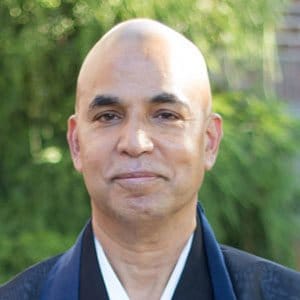
Rev. SeiFu Anil Singh-Molares
El Reverendo Seifu es Director Ejecutivo de SDI y sacerdote budista Zen ordenado, así como director/compañero espiritual practicante y orador motivacional. Es un veterano de numerosas iniciativas interreligiosas e inter-espirituales a lo largo de los años, incluyendo “Seeds of Compassion” (Semillas de Compasión) en Seattle en el 2008, donde fue uno de los presidentes, y como fundador y Director Ejecutivo de “Compassionate Action Network”. Tiene un Máster en estudios teológicos de la Universidad de Harvard. El Reverendo Seifu es orador y conferencista universitario y colaborador clave con la Fundación Nacional de Becas Woodrow Wilson. En su vida anterior, también fue ejecutivo de Microsoft, donde cultivó exitosamente grupos y divisiones internacionales y proporcionó liderazgo a equipos multi-culturales en todo el mundo.
Rev. Seifu is an accomplished speaker and university lecturer and is a key contributor for the Woodrow Wilson National Fellowship Foundation. In a previous life, he was also an executive at Microsoft, where he successfully grew international groups and divisions and provided leadership to multi-cultural teams around the world.
Faculty

Andrew Harvey is Founder & Director of the Institute for Sacred Activism, an international organization focused on inviting concerned people to take up the challenge of our contemporary global crises by becoming inspired, effective, and practical agents of institutional and systemic change, in order to create peace and sustainability. Andrew Harvey has taught at Oxford University, Cornell University, Hobart and William Smith Colleges, The California Institute of Integral Studies and the University of Creation Spirituality as well as at various spiritual centers throughout the U.S. He was the subject of the 1993 BBC film documentary The Making of a Modern Mystic. He has written and edited over 30 books and received many awards, including the Benjamin Franklin Award and the Mind Body Spirit Award
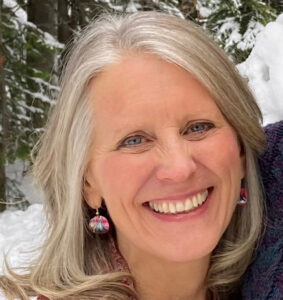
The Rev. Cynthia Brix, PhD (hon) is co-founder of Gender Equity and Reconciliation International (GERI), which has organized 280 intensive trainings in 18 countries for healing and reconciliation between women and men, and people of all genders. She is an ordained interfaith minister and Co-Director of Satyana Institute. She was formerly a campus minister at the University of Colorado for United Ministries of Higher Education. Cynthia co-chaired the Race Relations Committee for the City of Muncie, Indiana, and served in leadership positions for Planned Parenthood in Indiana. A long-time student of Eknath Easwaran’s Passage Meditation, Cynthia leads retreats on interfaith spirituality. She co-organized five international conferences on interspirituality, one of which brought women spiritual masters together from Buddhist, Christian, and Hindu traditions, and she produced a video from this conference entitled Cultivating Women’s Spiritual Mastery. Cynthia holds an M.Div. from Iliff School of Theology (2006), a double M.A. in wellness management and applied gerontology, and an honorary doctorate from the California Institute of Integral Studies (CIIS). She is an Evolutionary Leader, and co-author of Gender Equity & Reconciliation: Thirty Years of Healing the Most Ancient Wound in the Human Family y Women Healing Women: A Model of Hope for Oppressed Women Everywhere.
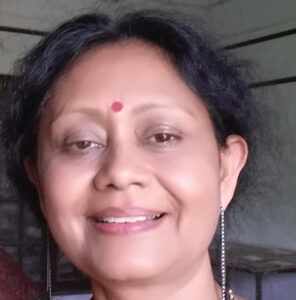
Dr. Neela Bhattacharya Saxena is a Professor of English and Women’s Studies at Nassau Community College, Garden City, NY. She is the author of Absent Mother God of the West: A Kali Lover’s Journey into Christianity and Judaism y In the Beginning IS Desire: Tracing Kali’s Footprints in Indian Literature. She teaches a course that she created called The Goddess in World Religions; her other classes include Science Fiction, British and American Literature, and multidisciplinary courses like Making of the Modern Mind and Studies in World Cultures. She is a member of the American Academy of Religion (AAR) and the Society for Asian and Comparative Philosophy (SACP). Her interests include Buddhist and Hindu Tantras, world religions, global literature, science fiction, mythology, and classical Indian music.
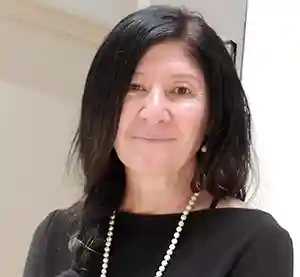
Alejandra Warden is a contemplative, counselor, international speaker, and author. Alejandra founded and directed the first two Montessori inspired schools in Argentina, her home country. Her book, Remembrance: A Vision of the Sacred Feminine and the Renewal of the Earth, delves deeply into the teachings of the Sacred feminine, and El Llamado de mi Corazon explores the guidance of dreams and mystical experiences on the spiritual path, with a particular focus on their importance in Sufism. Alejandra has been featured and interviewed in various radio and TV programs as well as the documentary As She Is, and has contributed to books and articles on the evolution of consciousness, prayer, meditation, and the Divine Feminine.

Camille Helminski is Co-Director of The Threshold Society (www.sufism.org), in the tradition of Rumi, has long been dedicated to facilitating direct personal experience of the Divine. She has helped to increase awareness of the integral contribution of women to the spiritual path of Islam with her now classic anthology, Women of Sufism. Together with her husband, Kabir, she has published some of the finest modern English translations of the poetry of Mevlana Jalaluddin Rumi. She is the first woman to render a significant portion of the Quran into English with the heart-opening The Light of Dawn, Daily Readings of the Holy Quran. Her latest book is The Way of Mary: Maryam, Beloved of God.
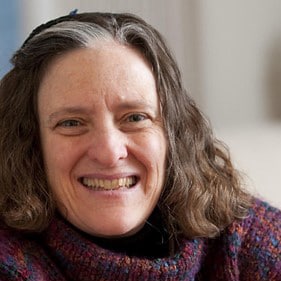
Rabbi Amy Eilberg is the first woman ordained as a Conservative rabbi by the Jewish Theological Seminary of America. She serves as a spiritual director, peace and justice educator, and teacher of Mussar (a classical Jewish system of spiritual development). She currently serves as Chair of the Racial Justice Subcommittee of the Conservative Movement’s Social Justice Commission and as Chair of Congregation Etz Chayim’s Anti-Racism Impact Team. Her book, From Enemy to Friend: Jewish Wisdom and the Pursuit of Peace, was published by Orbis Books in March 2014. She received her Doctor of Ministry degree from United Theological Seminary of the Twin Cities in 2016. She is a loving wife, mother of three wonderful adult children (and their partners) and exuberant grandmother of three extraordinary grandchildren.
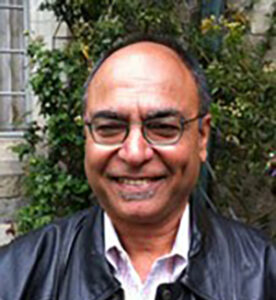
Ravi Verma is a spiritual director and has worked professionally with churches and lay leaders for over twenty-five years. Ravi’s passion is to work with individuals and groups to build bridges between parts of ourselves, with others and the cosmos based on our connection to the Divine. Ravi, born in India, now teaches at Stillpoint, and works with corporations, retreat centers, and non-profits on issues of spiritual development. Ravi is a past Chair of the Coordinating Council of Spiritual Directors International.
Calendario
Eleven weekly 90-120-minute sessions, 2-3:30pm Pacific time beginning October 3, 2023 and ending December 12, 2023. You can participate live or watch at your convenience later.
October 3 - Rev. SeiFu Anil Singh-Molares, Ravi Verma, Rabbi Amy Eilberg
Laying the foundation for the upcoming sessions.
October 10 - Dr. Neela Bhattacharya Saxena
Divine Feminine and Her Psycho-Spiritual Meaning – In the spirit of an auspicious friendship (Kalyan Mittata), this session will present the figure of the Divine Feminine around the world and discuss its psycho-spiritual import for humanity and planetary well-being. This introductory program will immerse you into the phenomena heralded by many as the worldwide re-emergence of the G/goddess. A profound inward turning of the self toward a deeper awareness of one’s connectedness to all sentient and non-sentient worlds is the gift of the Divine Feminine. Walking through the plural world of the Sacred Feminine you will see how her presence in a culture could shape women’s and men’s psychic realities. Both immanent and transcendent, she epitomizes non-duality and sacred materiality, so that we can honor our earthly existence and our interior dimensions.
October 17 - Dr. Neela Bhattacharya Saxena
Writing the Goddess- Revaluation of the “Graven Images” – In this continuing session, we will use images of the goddess to reach the depth dimensions of our being and invoke our inner goddesses through writing. While the prohibition against “graven images” in monotheisms was meant to take us to a transcendental world, in effect it had wiped out the goddess who was worshipped by women and men in antiquity as an immanent presence. It had profound consequences for our understanding of the world, but words too create such images. By combining images and words through writing, we will create a ritual environment to behold her cosmic significance and find the meaning of the divine in our earthly plain.
October 24 - Andrew Harvey
Description TBA
October 31 - Alejandra Warden
The Call of Love: The call towards interconnectedness that resounds within us, the call to a union that is beyond separation and distance, is the call of the Divine Feminine. She has returned to show us how things are connected to one another, how all life is completely interrelated, and to give birth to a new consciousness in humanity capable of recognizing this interrelatedness. She returned to re-weave and relink what had been severed —Heaven from Earth, spirit from matter, root from branches— and to reveal the one source that nourishes all paths, the common heart that beats and animates all things. Her invisible hand, thread, and loom have been critical to the rise of Interspirituality, a perspective based on the recognition of the common texture and essential unity of shared experience that exists behind all wisdom traditions. Interspirituality and interreligious fluency are marked by the building of bridges rather than fortification of centuries-old walls. The connections that are witnessed, formed and honored in this realm bear the stamp of the Divine Feminine and in this session we will explore her contribution.
November 7 - Ravi Verma
Fr. Bede Griffiths said “ I have to be a Hindu, a Buddhist, a Jain, a Parsee, a Sikh, a Muslim, and a Jew, as well as a Christian, if I am to know the Truth and to find the point of reconciliation in all religion. (Return to the Centre p. 71)
A group of us visited Shantivanam, the ashram founded by Fr Bede Griffiths (Hindu name Swami Dayananda -“bliss of compassion”).In this session we will explore a model of spiritual evolution, consciousness changes, shared with us at the ashram by John Martin Sahajananda, the leader there in Southern India . Using the image of a tree—the leave, branches, trunk and roots, we will explore how this model can inform us on our own spiritual journey. We will explore how this understanding can give us fluency and tools as we accompany others who might be at other stages, paths in their own spiritual journeys.
November 14 - Rev. Seifu Anil Singh-Molares
TBA
November 21 - Rev. Cynthia Brix, PhD
Dive into a heart-centered exploration of interspiritual practice as Cynthia shares wisdom teachings, personal stories, and specific practices that support effective spiritual companionship with clients from diverse spiritual traditions, or multiple religious belonging, as well as with multifaith groups.
Cynthia will draw from the mystics across the faith traditions, as well as experiences from her own life, that have guided and supported her on the interspiritual path. She shows how drawing from the depths of one’s own spiritual or religious tradition can tap into the universal wellsprings of mystical oneness, where all religions meet, and this provides an effective basis for spiritual companionship with clients of any faith tradition.
November 28 - Rabbi Amy Eilberg
Jews and Spiritual Direction: Challenges and Opportunities
This session will have three parts. First, we will dive into the art and practice of interfaith encounter, as it applies to spiritual direction. Then, I will share some thoughts on what it is helpful for Christian spiritual directors/companions to know about Jewish spiritual seekers. Finally, we will spend some time exploring the challenges and possibilities for the SDI community as SDI continues its transition from a predominantly Christian organization to a broader spiritual circle.
December 5 - Camille Adams Helminski
“The Way of Mary, the Way of Love” – In all our movement through the caravans of this world, we may sometimes become lost in the wanderings of the mind, but then we are suddenly found by the One Finder (Al-Wajid), by Love (Al-Wadud) and our hearts and souls are strengthened in remembrance of that One. And so the Water of Life flows, greening our hearts and our world, enabling the outpouring of Divine Compassion (ar-Rahman).
During this session we will reflect with the principles of the Sufi path as inspired by the Quran and the example of Prophet Muhammad, the teachings of Rumi and his beloved mentor, Shams of Tabriz, as well as the being of Beloved Mary, mother of Jesus, “Hazrati Maryam,” as the purest of souls, receptive to Divine Inspiration, an open doorway of Love.
Rumi’s mentor and beloved friend, Shams of Tabriz, encourages us to keep turning towards the heart to find that One who finds us—even as beloved Mary must have done when she had lost her son—and in that process to be willing to undergo the trials that expand the heart to be able to encompass more and more fully that Presence of Enlivening Grace. We will share reflections from The Way of Mary: Maryam, Beloved of God, facilitating our witnessing together of the Oneness of Spirit enlivening us all.
As Rumi says:
The eye of the Sea is one thing, the foam another;
leave the foam and look with the eye of the Sea!
The water has a Water that is driving it;
The spirit has a Spirit that is calling it.
December 12 - Rev. SeiFu Anil Singh-Molares
Part 1: Buddhism and Interspiritual Fluency; Part 2: Harvesting of Course Learning
There Are So Many Online Courses. Why This One?
Reputable
SDI is the largest and oldest network of spiritual companions in the world. For 30 years we have been creating and curating educational offerings for spiritual companions across religious traditions, and we have our finger on the pulse of the spiritual companionship movement in the US and beyond.
Faculty
Our instructors are the best in the field. You will be in an intimate learning environment with some of the most renowned and sought-after spiritual teachers in the field of spiritual companionship.
Affordable
We are committed to making our courses widely available and accessible. We are keeping the course tuition low and have a generous number of scholarships to give out. We strongly encourage any for whom the cost is a challenge to apply for a scholarship.
Convenient
Watch the lessons when you can, complete the course at your own pace. You will have access to the course content for an entire year after purchase.
Experiential
Life learning, not book learning. Experiential, contemplative, spiritual. We want to open a gateway to understanding and connection. We’d rather companion you to an insight than impress you with a list of facts. Because most of our audience are spiritual directors and companions – including chaplains, life coaches and others who offer spiritual care -, we focus on the practical and care-giving side of the equation.
Welcoming
This introductory level course is open to all! There are no prerequisites and no required readings. Each session will include a basic primer in the fundamentals of that week’s tradition or orientation. It will be easy to experiment, ask questions, and try out some of the techniques taught in the course.
INTERFAITH DIALOG IN THE LAST 150 YEARS
The 1893 World’s Parliament of Religions—held in conjunction with the Columbian Exposition in Chicago—opened on September 11, 1893, with international representatives of the world’s religions present. An Indian delegate, Swami Vivekananda, riveted the audience with his call for religious tolerance and an end to fanaticism. Over the next several weeks, thousands of attendees came to hear Swami Vivekananda and other leaders speak, making the Parliament a watershed moment in interfaith dialogue.
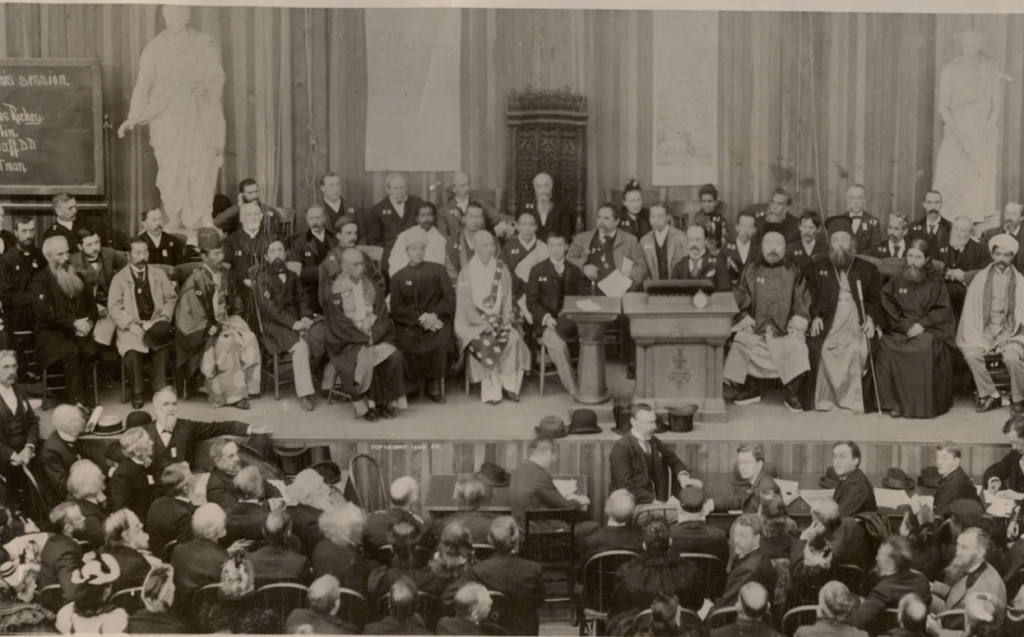
A FEW INTERFAITH LUMINARIES
RaImUNDO Pannikar
Raimundo Pannikar (1918 – 2010) was born to a Spanish Roman Catholic mother and an Indian Hindu father. He wrote extensively on comparative religion and was a proponent of InterFaith dialog.
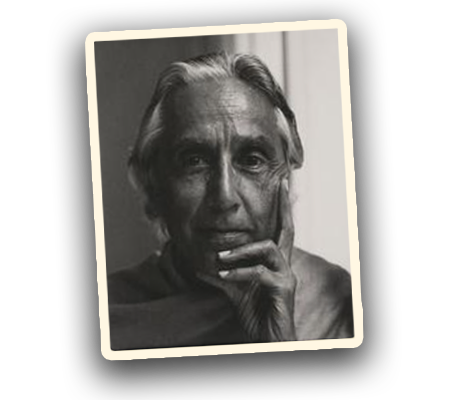
HUSTON SMITH
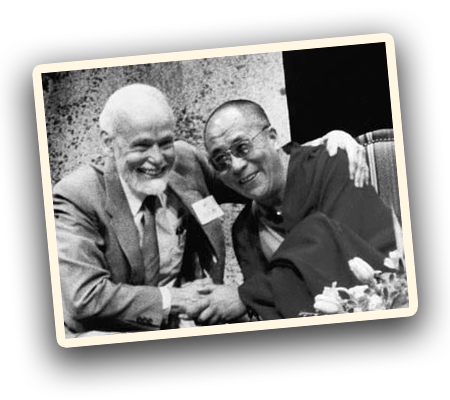
Huston Smith (1919 – 2016) was a scholar of religious studies, authoring over thirteen books on the world’s religions and philosophy. Originally a Methodist, he studied Vedanta and Sufism, ultimately following in the Way of the Mystic Seeker.
Mahatma Gandhi
Mohandas Karamchand Gandhi (1869- 1948) led the nonviolent movement for India’s independence from British rule. Gandhi’s vision was centered on religious pluralism. He was killed at an InterFaith prayer Meeting in Delhi.

BEDE GRIFFITHS
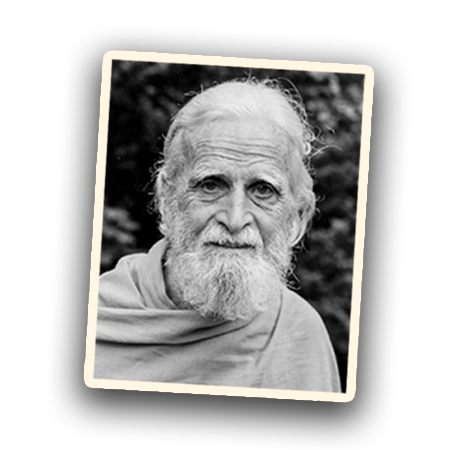
Bede Griffiths was a Benedictine Monk from England who lived in ashrams in South India and became a noted yogi. He was also known at the end of his life as Swami Dayananda (“bliss of compassion”).
MIRABAI STARR
Mirabai Starr is a writer, translator, and retreat leader who has built bridges among spiritual traditions for many years. Her influences include Ram Dass, Reb Zalman Schchter-Shalomi, and the teachings of Murshid Samuel Lewis, which have formed the universal quality in Mirabai’s work ever since.
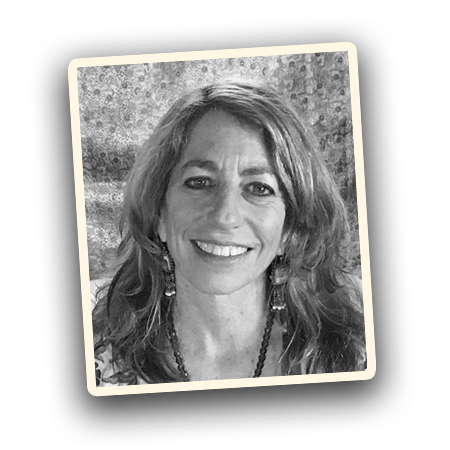
By engaging in dialogue, we gain insight into the unique paths and practices of others, broadening our perspective and deepening our own spiritual journey. Such encounters provide opportunities for personal growth, as we confront and transcend our own biases and preconceived notions.
Credits
22 CEU credits available.



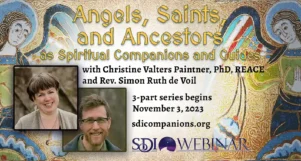
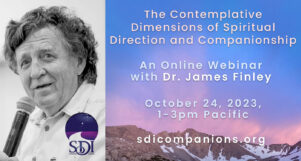
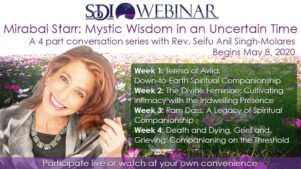

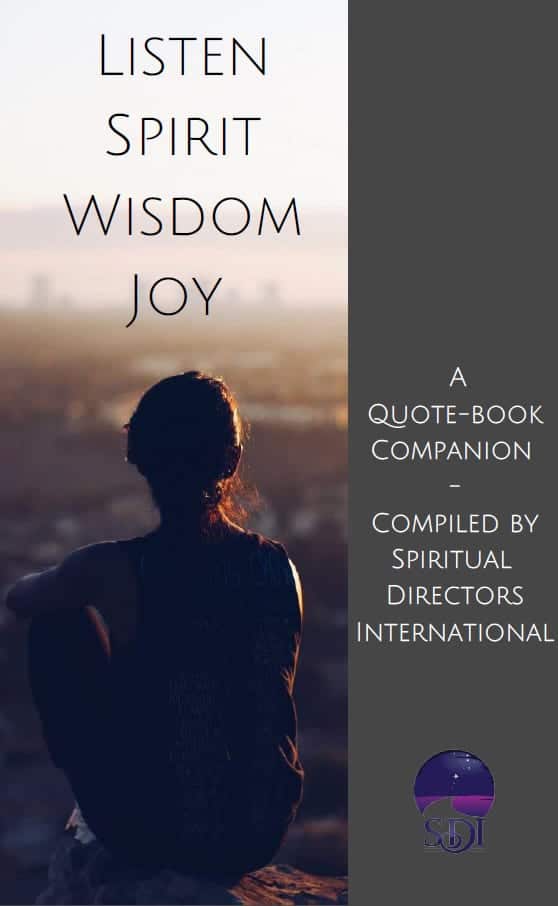
Valoraciones
No hay valoraciones aún.